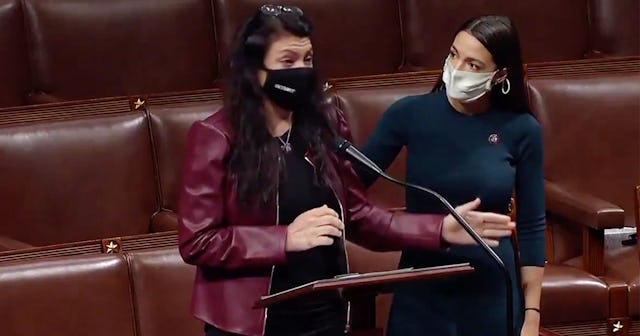Rep. Rashida Tlaib Breaks Down Sharing Her Account Of The Capitol Riot

Rep. Rashida Tlaib began to cry as she detailed her personal account observing the Capitol attack on Jan. 6
In an emotional speech, Rep. Rashida Tlaib of Michigan, discussed the events of Jan. 6 when Trump-supporting insurrectionists violently took over the Capitol building in a last-ditch effort to disqualify the results of the presidential election. Tlaib, who wasn’t present inside the building that day, was speaking as part of a special order hour organized by Rep. Alexandria Ocasio-Cortez where lawmakers were called on to recount their own experiences during the attack.
Tlaib began her speech by recalling the threats she’s received since her very first day on the job as a state representative.
“On my very first day of orientation, I got my first death threat,” she explained. “It was a serious one. They took me aside, the FBI. I didn’t even get sworn in yet and someone wanted me dead for just existing. More came later. Uglier, more violent.”
The FBI had to visit the man’s home because the threat was valid enough to warrant such a visit. “I didn’t even get sworn in yet, and someone wanted me dead for just existing,” Tlaib said.
She said that since then, the threats to her life continued to come and became “uglier” and “more violent.” One, she said, celebrated the New Zealand massacre where a man killed 51 worshippers at two mosques in Christchurch. With her voice breaking with emotion, Tlaib said another threat mentioned her son directly by name, she said.
“Each one paralyzed me each time,” Tlaib said. “So what happened on January 6th, all I could do was thank Allah that I wasn’t here.”
During the heartbreaking speech, Tlaib’s friend and fellow Squad member, AOC, moved to comfort her and show solidarity and support while Tlaib spoke.
“All I wanted to do was to come here and serve the people that raised me,” Tlaib said about serving in Congress as a representative for the state of Michigan, mentioning that her own family begged her to get protection and to even carry a gun. She expressed relief at not being present during the insurrection, since investigators and experts believe the attack could have been far deadlier if a handful of people (shoutout to officer Eugene Goodman) hadn’t thought quickly on their feet to deter rioters from harming members of Congress.
“The trauma for just being here and existing as a Muslim is so hard,” she said. She mentioned that she employs a diverse staff and that she’s always concerned for their welfare. “I worry every day for their lives because of the rhetoric, I never thought they would feel unsafe here, so I ask my colleagues to try and not dehumanize what is happening, this is real.”
Last week during an Instagram Live, AOC openly talked about the trauma she personally faced on Jan. 6, particularly as a target of the rioters. Since the attack, AOC said Republican members of Congress have told her and other survivors of the Jan. 6 attack to “get over it,” and she compared that to tactics used by abusers to silence their victims.
“The folks who are saying we should move on, we shouldn’t have accountability, etc., are saying: ‘Can you just forget about this so that we can do it again?’…I’m not going to let it happen to me again,” she said, “and I’m not going to let it happen to our country.”
At the beginning of the hour of speeches on Thursday, AOC once again described the events that unfolded last month and the vast impact the attack will have on American politics.
“29 days ago insurrectionists attacked our Capitol to overturn the results of our nation’s election. 29 days ago the glass in and around this chamber was shattered by gunshots, clubs, by individuals seeking to restrain and murder members of Congress, duly elected to carry out the duties of their office,” she said.
“Sadly less than 29 days later with little or no accountability for the bloodshed and trauma of the 6th some are already demanding we move on, or worse attempting to minimize, discredit or belittle the accounts of survivors,” she added. “In doing so they not only further harm those who were there that day and provide cover for those responsible, but they also send a tremendously damaging message to survivors of trauma all over this country.”